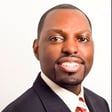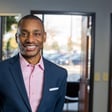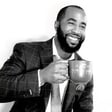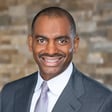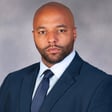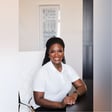Empathy in Customer Experience
00:00:00
Speaker
I am not in my body, but I am out of body and I am observing and doing and feeling what the customer would feel. I want the artist to portray me walking in the shoes of the customer, right? Initially, you know, I would have the artists create a visual of that walk such that I could share
00:00:30
Speaker
with everyone in the company, right? So they could understand how their actions and their decisions impact that customer's wall.
Introduction to 'Take Your Homeboy to Work Day' Podcast
00:00:40
Speaker
What's up world? Have you ever wondered, what does my friend or cousin or partner actually do at work? If so, listen to Take Your Homeboy to Work Day podcast, the premier podcast to learn about careers and trades.
00:00:57
Speaker
Each episode, I interview guests from different professions and dive into the arcs of jobs held, the education and training received, the skills and experiences acquired, of course, how much you can earn, and the intrinsic fulfillment that motivates them. So for anyone interested in hearing the firsthand experience of a specific career, these conversations are your launching pad.
00:01:25
Speaker
And please subscribe, follow, like, and rate five stars on LinkedIn or wherever you get your podcasts. We'd love to have your support.
Role and Vision of a CXO
00:01:34
Speaker
Today's episode will feature the role of a customer experience officer. The customer experience officer or CXO is a fast growing role in business culture.
00:01:48
Speaker
This person ensures that the company vision and values match with the customer's experience using their product or service. They shape what a company offers to its customers. So for example, if I visit an airport lounge such as the Delta Sky Club, the CXO of the Delta Sky Club would set standards for the greeters, service staff, and kitchen to ensure that I am happy and comfortable during my trip.
Meet Thomas Linton: A Versatile Professional
00:02:17
Speaker
Ultimately, they make sure the customer is getting the most value out of that product or service for the company.
00:02:25
Speaker
And as a salesperson myself, this philosophy is the north star of success. So I was very eager to get Thomas Linton on the show. Thomas refers to himself as a customer zealot and has succeeded developing products and services at banks, consumer packaged goods companies, financial service companies, and healthcare companies.
00:02:51
Speaker
His foundation is built on sales, marketing, engineering, project management, and even Six Sigma practices. So I am excited to learn from him today and see what lessons I can apply to strengthen my own sales future and how I service customers. So thank you for joining me today and welcome to the show, Thomas.
00:03:14
Speaker
Brandon, thank you so much for having me. It's such a pleasure. I love what you're doing. Giving back to the community is just awesome, man. So thank you for the invite. Glad to be here. Thank you so much for the support. I appreciate those words. I will continue this work. And in the introduction, I gave a brief synopsis of what I think your career and what a CXO does. But in your own terms, can you explain your career journey and what a customer experience officer is, how you look at it?
Thomas Linton's Career Journey
00:03:44
Speaker
Absolutely. My career has been keenly focused on the customer from my early times as an electrical engineer to my most recent role as a chief marketing officer and all the roles in between.
00:03:58
Speaker
You know, while I've had functional roles in marketing sales, customer experience, and Six Sigma engineering, again, the career has been really focused on solving problems. So, you know, that's the whole thing of a CXO. They really focus on the needs of customers and really try to make sure that those needs are satisfied, not only focused on the customer, but focused on, you know, the organization and the internal processes of an organization.
00:04:29
Speaker
Gotcha. Gotcha. Okay. And I guess how did you stumble into this type of work? You know, so I know you have done a lot of work. I mean, you started off as an engineer. You also spent time with sales and marketing, but how did, how did you build into this? Who introduced you to a customer experience officer? How did you get into this type of work?
00:04:53
Speaker
You know, it's interesting. Before I start with the customer experience officer, I mean, I got to go back to the foundation of my career, which is my engineering background. And the way I got started in engineering, man, was I was really good in math and science. And one of my middle school teachers was very influential. They said, hey, if you're good in math and science, you should consider a career in engineering.
00:05:17
Speaker
As a child, I was very, very curious. I used to tinker with things. But while in high school, I attended a pre-engineering summer program at the University of Louisville, and it was great. After that, I decided to go the engineering route. As for the customer experience part of it,
00:05:38
Speaker
I would say that started as my career started in business,
Transition from Engineering to Business
00:05:43
Speaker
right? I shifted from business to engineering, from engineering to business. And as a young engineer, I was in this meeting and I was designing lamps for the European market at the time. And one of our account managers had just come back from a chip from Europe and he was explaining to us
00:06:03
Speaker
the feedback he got from customers, what they were looking for. And I'm like, man, I really want to be that guy. So I started and talking to my mentors about, hey, how can I be him? And to make a long story short, I ended up going back to business school to get my MBA in marketing. And that's really what started my journey into the customer experience realm.
00:06:30
Speaker
Very cool. You know, one of the things I love highlighting are when people make a pivot in their careers or, you know, as people say, you know, in a previous life, I used to do this. So, you know, I'd love to ask you a question. When you wanted to transition to business, but you were still doing engineering roles, how did you stay motivated? Because you knew where you wanted to go next, but you were still in what you currently were doing.
00:06:56
Speaker
And sometimes that can hold people back because they don't feel like they are living their purpose. So how did you navigate those years while you were getting your MBA and trying to transition to business, but still serving in an engineering role?
00:07:10
Speaker
Yeah, I think the most important part of that Brandon is the company that you with and are they helping you with career development, right? Many companies will tell you that career development is based off of you and you driving and helping your career. So for me, one of the things I was able to do while I was in engineering, I asked for an assignment
00:07:37
Speaker
in manufacturing engineering where I was developing people and responsible for manufacturing lines. So I had to people management responsibilities.
00:07:46
Speaker
and then had some responsibilities with our quality team. Our quality team was also connected to the sales and product marketing team. And so those experiences, even though I was in engineering, gave me a perspective of, hey, how do other parts of the company work? And how do I leverage that as I'm thinking about making this shift to the business side?
00:08:15
Speaker
Gotcha, gotcha, very smart. So I guess the first thing you said was one, you need to be in control of your own career. And then two, well, I guess the main thing is just to be in control of your own career. So thank you for sharing that.
00:08:30
Speaker
MBA school, can you share what was the process like first getting into MBA school? And then what, I guess, yeah, again, what was that experience like for you going back, having experience, work experience, and then being in MBA school? What can you talk to us a little bit about during that timeframe?
00:08:48
Speaker
Yeah. So the process is pretty rigorous, man. I'm not going to sugarcoat it. There's a lot of things you got to do. You got to take the exam. And so back in the day, I took the GMAT, the Graduate Management Acceptance Test. But I think today they allow you to take the GRE. I think this is the Graduate Record Exam or something like that.
00:09:15
Speaker
But you got to take the exam. I wasn't a good test taker. So I took the exam a couple of times and I'm like, hey, my test is my test. Wherever I go is where I go.
The MBA Journey and Its Impact
00:09:29
Speaker
one thing. Secondly, you know, there's the application process. You got to decide which schools you're going to go to. And for me as an engineer, you know, the biggest challenge I had was writing, right? I'm an engineer. I wasn't a writer. You had to write these essays for why you wanted to do business and, you know, all these good things. And so I needed help, right? So I got help from an editor to help me with that. But I think the most important component of it is,
00:09:57
Speaker
I mean, you have to have you have been doing well in your current role, right? You know, everyone has a story about what they want to do and how they want to do it. But, you know, if you don't have any key experiences from your current role and caring experiences, it's going to be, you know, difficult to show how you're going to add value to
00:10:24
Speaker
that upcoming business school class. And so those are the three things, right? Taking the test, writing the essays and all of the applications and then really making sure you're kicking butt in your current role. Gotcha. Thank you. Thank you for those words. Okay. So we're getting through MBA school. We graduate with the MBA. What was your first opportunity after you earned your MBA?
00:10:55
Speaker
Yeah, my first opportunity was in the oil and gas chemical industry. I was a senior customer analyst and, you know, it was an interesting role.
00:11:09
Speaker
I was able to, in that role, leverage some of the experiences and education that I got in business school. My first assignment was helping this business unit create a strategic plan.
00:11:26
Speaker
And for those who've been to business school, you know, you've heard of the Portify Forces model, and it's a model that allows you to assess customers and competition and suppliers. And I was able to use that framework to help our organization develop a strategy.
00:11:45
Speaker
And I was like, man, I just learned this in business school last year. Now I'm able to apply it. I was excited, man. Yeah, yeah. So that was in your customer analyst. Well, that's very cool. I know you learn a lot about the theories in school, and then to actually put them in practice is very exciting. So I could tell from even how you were saying, I totally understand that feeling that you were expressing. So that's very cool that you got to put that theory in practice.
00:12:15
Speaker
And I guess, and this is kind of a question, I appreciate your candor on, while we're talking about the first job that you earned after you got your MBA, I love for people to know how much they can earn after achieving a degree or starting off in a path. And especially those early years when salary may not be as high as once you get your experience and get to director level.
00:12:42
Speaker
Could you give a range of what that salary was for that first job? Yeah, I'm going to give you two perspectives of it. I'm going to give it to you from an engineering perspective because I started my career in engineering.
00:12:58
Speaker
Man, I was making a whopping $35,000 a year as an engineer. I was excited. Right. And remember, I had a bachelor's and a master's of engineering when I left school. And so I started my first job. And so I think today the range for kind of an electrical engineer is between 70, 80,000, depending on what school you go to, it could be a little bit more.
00:13:22
Speaker
And so as a, coming out of business school, my salary was 60,000. So I almost doubled my salary from an engineer to a business person. So, you know, I was really excited. I think today the range for a marketing manager with an MBA is about 110 to 130,000.
00:13:43
Speaker
So people always ask me, do you think it was worth it? Absolutely, it was worth it. You know, I know school is very expensive, but the foundational education I got plus the bump in salary made it absolutely worth it.
00:13:59
Speaker
Awesome. Awesome. That's great to hear. Well, first, thank you so much for sharing a topic that I know sometimes can be sensitive, especially about finances. So I appreciate you being open. The whole goal is just to inform the audience. So thank you very much for sharing that. Absolutely.
00:14:17
Speaker
So diving back into the customer experience role, and I know you've served in a lot of roles, so feel free to pick from wherever feels most appropriate. But I want to put on, I'm putting on my ownership, business ownership lenses and glasses now. So I'm coming from that perspective. And if I'm coming to you as my CXO,
00:14:44
Speaker
And I'm giving you a salary, then there's a return or an output that I'm expecting from you. And so I guess, can you explain what is the value that you create for the owner of a company for those customers? Can you break down how you perceive the value you create for the owner of the company?
Value of a CXO in Business
00:15:11
Speaker
Yeah. So this is an interesting question. So in every role that I've had, I've always been expected to deliver results. And I use the words results in a very broad term, because as an engineer, I would have responsibility for designing lamps. And I had to make sure the lamps met the customer specifications. As a product manager, I had to
00:15:39
Speaker
provide the requirements to the engineers to develop the products and getting the feedback from customers to make sure, again, that the product met the needs. And then as a general manager, I had sales goals. I had to deliver sales to the company. And so every role plays a critical role in business. It's all about the team effort.
00:16:04
Speaker
But, you know, it's all about expectations, making sure you're clear on what the expectations are of you and how you fit into the overall picture of the company and then delivering it to the best of your ability with excellence.
00:16:21
Speaker
You brought up the word team, and I guess I wanted to ask a question about your youth. Did you do any extracurriculars, team sports or team competitions, maybe debate club or chess club?
Team Sports and Professional Skills
00:16:35
Speaker
Are there any of your childhood experiences that tie into what you had to deliver as a CXO?
00:16:44
Speaker
Yeah, I think as a as a youth, right, I played football, I played basketball and man, I can't stress enough for
00:16:58
Speaker
any youth to play a team sport. So I had four daughters and I had each one of them play a team sport. I said, I don't care what sport it is, but play a team sport because there's so many life lessons you get from playing a team sport. One, you got to figure out how to work with your teammates.
00:17:17
Speaker
Two, you got to figure out how to work with a coach, which in business becomes a boss, right? Three, you got to figure out, you know, if you're going to lead, if you're going to follow. And, you know, I learned all of that in different areas, different aspects of playing sports as I was growing up, right?
00:17:40
Speaker
You know, I play different roles. It depended on the game. It depended on the team, right? I might be a point guard one day. I might be a shooting guard the other day. I might be a quarterback one day. So I think the team aspect is so critical in business. It is the only way that young leaders will be successful is understanding how to play a critical role on the team.
00:18:05
Speaker
Wow. Well, thank you. Thank you. You know, you had mentioned teams so often and I guess navigating challenges, I felt like you had a background in sports. And so it just, thank you for answering that question. It was something scratch itching in my head. I had to ask. So I appreciate it.
00:18:22
Speaker
Now, I asked you to look at your role with those ownership glasses on. And so now I want to switch the glasses and come from a customer experience. And so
CXO's Impact on Customer Service and Marketing
00:18:38
Speaker
how does what you do manifest itself for a customer? So if I'm out and about and I wanted to point to something and say, hey, here's an example of what a CXO does, what could I point to to bring a physical representation of what you do?
00:19:03
Speaker
There's one example that would give you in my previous role in health care, right? So one thing you could point to is many potential patients, right? They actually go on Google, go online and search for, hey, I need help with X. I need help with Y. And so as a marketer, as a customer experience executive,
00:19:28
Speaker
You know, one of the things I was able to do was put together a marketing plan that says, Hey, when they are searching for this service, you know, how can we be where they are?
00:19:43
Speaker
and provide them some content that allows them to say, oh, this is a company that has a potential solution to my needs. And so let me go check them out. So that's one way. The other way, as a customer experience executive, is once they get on a phone with an agent,
00:20:06
Speaker
Um, you know, being able to make sure that agent understands and has empathy for that caller, whether it's a patient, potential patient, a family member has empathy, but really setting the guidelines and the foundation for how that call should be answered and how that
00:20:23
Speaker
you know, a person should be treated when they're called in. So those are two examples. One is being available when customers are looking to get help, and then two, once they reach someone, you know, having that be a really good experience.
00:20:41
Speaker
Very cool. I love the phrase on your LinkedIn that says that you are a customer zealot. That really just speaks to me, especially as a salesperson. And I can tell that you love providing people with a good experience or giving people what they expect and whether that your customer is internal or external. So I love that about your philosophy on work.
Thomas Linton's Greatest Achievements
00:21:11
Speaker
And so I guess over your career, what has been your proudest achievement?
00:21:21
Speaker
My proudest achievement has nothing to do with work, right? My proudest achievement has to do with my family. I've been married for over 32 years. I have four beautiful, intelligent, successful daughters who've all graduated from college. So creating a family environment of love and respect is absolutely my proudest achievement.
00:21:47
Speaker
But I will answer your question directly. You know, professionally, you know, as a budding kind of product manager early in my career.
00:21:58
Speaker
and telecommunications are responsible for developing this new kind of product, right? And in that process, right, I was able to, you know, go out and talk to customers, both doing qualitative research and quantitative research to see what features that they really, really wanted.
00:22:23
Speaker
But going back and forth with them on what's important to them, what they would buy, we've created products that met their needs and the successful part about it is I was awarded two patents for that work on creating solutions for customers. So that was a proud moment professionally for me.
00:22:46
Speaker
Yeah, yeah, I guess, could I, what's it, so to earn a patent, what does that actually mean? Could you break down that process and what that actually means?
00:22:55
Speaker
Yeah, so a patent is something you file with the government. And what it really is is, hey, have you truly found a differentiated way to do something different than anyone else has ever done? And as such, you go claim benefit for that. So if somebody else tries to replicate it,
00:23:23
Speaker
they can. They can get sued if they replicated kind of what you did. So that's what a patent is. And again, this was early, early in the long distance industry. But man, I was very excited about that. Yeah, I could imagine. I guess do you have like a certificate of your name and the patent that she created hanging up in your office? I imagine you've really blown this up. That seems impressive.
00:23:49
Speaker
I have it, but it's not on my wall. I have my degrees on my wall, but not the patent. I probably should pull it out of the archives and give it on the wall. Very cool. Well, first, salute to you for building a healthy family, and then also for being a part of two patents. That sounds like life-changing work, and congratulations. That is amazing.
00:24:15
Speaker
Thank you for listening to Take Your Homeboy to Work Day podcast. This concludes part one. Check back in on Friday for part two. But before you go, we need your help to spread our message. So please subscribe, like, and rate five stars wherever you get your podcast and on LinkedIn at Take Your Homeboy to Work Day podcast. Thank you.



